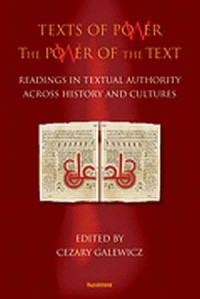Texts of Power. The Power of the Text. Readings in Textual Authority Across History and Cultures, edited by Cezary Galewicz
Cezary Galewicz

| Dane szczegółowe: | |
| Wydawca: | Homini |
| Rok wyd.: | 2006 |
| Oprawa: | miękka |
| Ilość stron: | 274 s. |
| Wymiar: | 165x235 mm |
| EAN: | 9788389598868 |
| ISBN: | 83-89598-86-0 |
| Data: | 2007-02-12 |
Opis książki:
Artykuły zebrane w tomie łączy zainteresowanie współczesnymi pytaniami o formy i granice autorytetu i integralności tekstu. Pytania te - formułowane przez autorów reprezentujących europejskie i amerykańskie ośrodki badawcze – inspirowane są zjawiskami z pogranicza literatury, krytyki tekstu oraz historii i dotyczą kilku obszarów kulturowych oraz epok historycznych (antyczna i hellenistyczna Grecja, świat Islamu, Persja i średniowieczny Iran, starożytne i średniowieczne Indie). Lektura tomu wskazuje, że problematyka autorytetu tekstu uwidoczniona może zostać jako ważna i inspirująca przy pomocy całkowicie odmiennych kategorii w zależności od kontekstu historycznego i kulturowego danego przypadku. Wspólnym mianownikiem pozostaje refleksja nad przeszłością, kontynuacją i zmianą w dziejach tekstów i społeczności dających im życie oraz dynamiką wzajemnego oddziaływania jednych na drugie.
Textual authority, as well as textual integrity and other dimensions of textuality, depend on and themselves shape the complex process of working out cultural legitimation which as a broader concept remains at the background of most essays contributing to the present volume.
The aim of the volume is to map, however partial it might be, various answers to the not easy question of what do we actually mean and aim at while using the noun authority or the adjective authoritative in reference to texts.
How much, to what extent and in what ways does the “authority of the text” remain with an “authoritative copy” or “authoritative edition” and how much with an “authoritative reception” - Do certain types of textual authority reflect the contents of the text? What happens to textual authority through text transmission — oral, performing, manuscript, printed, electronic? Is textual authority something that is transmitted with the text or rather something worked out and built up through the transmission itself? In what ways does textual representation through translation, exegesis, commentary, affect textual authority. Is there a final authority of a text? If so, how far is it removed from the author and in what part is it composed by editorial, production and circulation processes? Most of the texts making up this volume concern the past but, as one of them expressly states, dealing with the past in terms of texts isn’t anything like an antiquarian’s work only. It constitutes an important link with the future whose understanding and shaping needs first an understanding of the past and the secret of continuity, persistence and change.
Książka "Texts of Power. The Power of the Text. Readings in Textual Authority Across History and Cultures, edited by Cezary Galewicz" - Cezary Galewicz - oprawa miękka - Wydawnictwo Homini. Książka posiada 274 stron i została wydana w 2006 r.
Spis treści:
Chapter I
1. Leroy Searle, Textual Integrity. Textual Authority: The Cultural Importance of Editorial Ethics ..13
Chapter II
1. Joanna Janik, Textual Tradition of Plato’s Dialogs: making, editing, circulating ..33
2. Pierre Chiron, Meaning and Function of the Systematic Frame of the Treatise On Style (Ps.–Demetrius Phalerum) .43
3. Charles Guerin, Cicero as a User and Critic of Traditional Rhetorical Patterns: structural authority from De Inventione to De Oratore ...57
4. Tomasz Polański, Literalism and Paraphrase as a Means of Preservation of Religious Textual Authority in the Coptic, Greek and Latin Asclepius’ Apocalypse ..83
Chapter III
1. Anna Krasnowolska, A voice from heaven: Functions of the dream in Persian epic literature ..95
2. Ziva Vesel, Occult Sciences: compilers and authority ...107
3. Marek Smurzyński, The Veiled Text in the Islamic–Persian Textual Tradition and Its Authoritative Power 123
Chapter IV
1. Cezary Galewicz, The Fourteen Strongholds of Knowledge: On Scholarly Commentaries, Authority and Power in XIV c. South India 133
2. Federico Squarcini, na mlecchabchasam śikseta. On the Authority of Speech and the Modes of Social Distinction Through the Medium of Language in Classical India ..153
3. Ignacy Nasalski, And who is more unjust than he who forges a lie against Allah? Lying and denying and the problem of textual authority in the Koran ..169
Chapter V
1. Renée Koch–Piettre, Les xunthêmata dans Sophocle, OEdipe à Colone. De l’autorité des serments, des mots de passe, et de leur support inscrit 227
2. Aurelien Berra, Pythagoras’ Riddles. The Use of the Pythagorean Akousmata 245
3. Iwona Milewska, Duels on words and images: the Mahabharata as a treasure — house of riddles ..259

